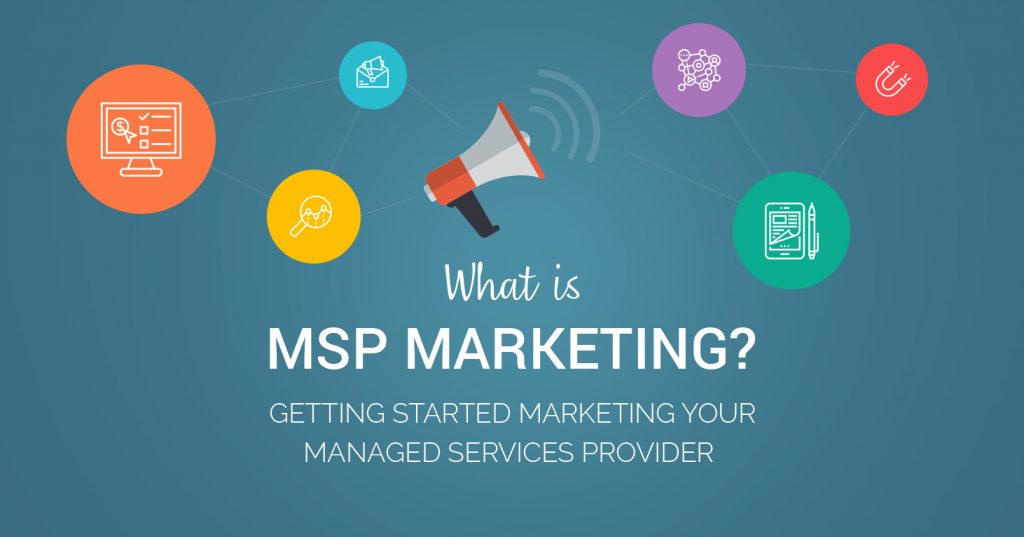
What is MSP Marketing? Getting Started Marketing Your Managed Services Provider
Want to learn more about marketing your MSP? In this post, we’ll cover:
- What is MSP Marketing?
- What’s New in the MSP Marketing World in 2024?
- The State of MSP Marketing in 2024
- What is the Difference Between MSP Sales and MSP Marketing?
- Why Do You Need MSP Marketing?
- How to Develop a Robust MSPs Marketing Strategy?
- What is included in an MSP Marketing Plan?
- MSP Marketing Phrases & Terminologies You Should Know
- How to Correctly Implement Cohesive MSP Marketing
- What Marketing Tactics Are Available to MSPs?
- MSP Marketing Best Practices
- Challenges in MSP Marketing
- How MSP Marketing is Different from Marketing in Other Industries
- The Future of MSP Marketing
- Bottom Line: The Cold, Hard Truth about MSP Marketing Scope
What is MSP Marketing?
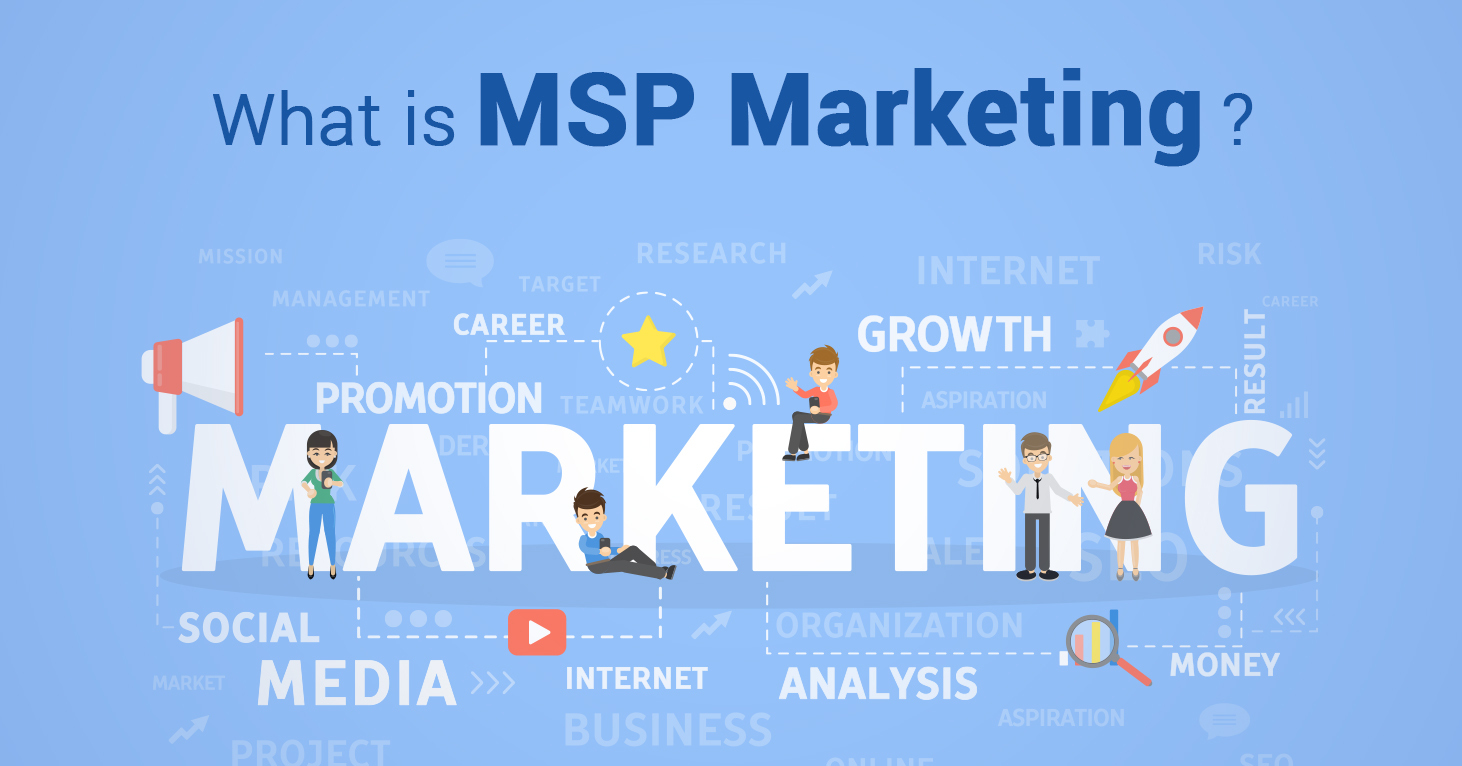 If you’re just starting out as an MSP, or you’ve been at it for a while already, the idea of marketing your services to find new customers has no doubt crossed your mind.
If you’re just starting out as an MSP, or you’ve been at it for a while already, the idea of marketing your services to find new customers has no doubt crossed your mind.
Techniques used when marketing for MSPs rely on the same basic principles of other forms of B2B marketing, but as an MSP, you should be aware of the unique challenges that come with drawing up interest for a fully managed IT service. Promoting your MSP in conventional marketing methods is easier said than done. Marketing undertaken by MSPs like yourself needs to be carefully considered and executed.
When it comes to marketing for managed service providers, we’ve seen the most success using a blend of traditional and internet marketing strategies. You can also use buyer personas to shape your marketing strategies; your prospects may find you through local searches like managed service providers near me or even direct phone and email queries.
What’s New in the MSP Marketing World in 2024?
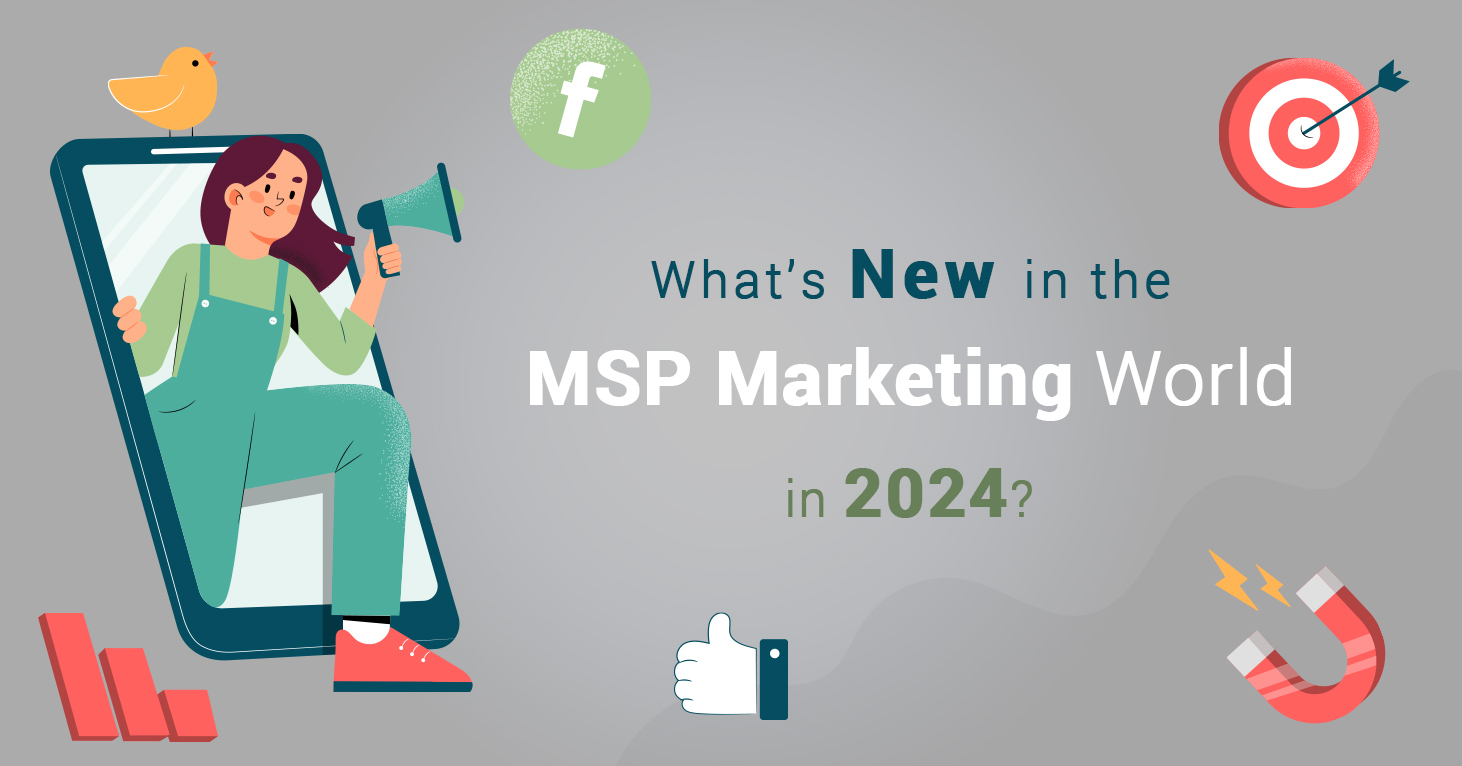
Since I originally wrote this article in 2018, it’s fair to say a lot has changed in the world of MSP marketing, however, on the most basic level many things have also stayed the same. While the rest of this article, certainly holds true, here are a few things to think about (along with some resources) as you build your 2024 and 2025 MSP marketing strategy:
-
Video Marketing for MSPs: Video marketing remains crucial for MSPs in 2024, mirroring the broader trend of video content’s growing dominance in digital marketing. The emphasis, however, is on cost-effectiveness. Unlike earlier years where high production costs were often seen as a necessity, there’s now a recognition that successful video marketing doesn’t require exorbitant spending. MSPs are leveraging more affordable video creation tools and platforms to produce engaging content that resonates with their audience, focusing on delivering value and relevance over high-end production quality.
-
Podcasting in MSP Marketing: Podcasting has become a significant channel in the MSP marketing toolkit. The key strategy here is to use podcasts as a means of engaging directly with potential clients. Instead of merely trying to attract prospects to listen to their podcasts, MSPs are inviting these prospects to participate in the podcast itself, often in the form of interviews. This approach not only provides valuable content for the MSP’s audience but also builds stronger relationships with potential clients, positioning the MSP as a thought leader and trusted advisor in their field.
-
Break/Fix Services Resurgence: Interestingly, offering break/fix services has re-emerged as an effective MSP marketing strategy. This marks a shift from the previous focus solely on managed services. The “Help First” attitude is central to this strategy. By providing immediate, no-strings-attached assistance to potential clients facing IT issues, MSPs can demonstrate their expertise and value. This approach not only helps in building trust and credibility but also opens up opportunities for converting these prospects into long-term managed service clients, thereby increasing both sales and Monthly Recurring Revenue (MRR).
-
Emphasis on Customer Experience (CX) in Marketing: MSPs are increasingly recognizing the importance of customer experience in their marketing strategies. This involves tailoring the customer journey to be more engaging, intuitive, and user-friendly. From the initial contact through to service delivery and support, MSPs are optimizing every touchpoint to enhance customer satisfaction. This approach not only helps in retaining existing clients but also serves as a powerful marketing tool, as satisfied clients are more likely to recommend the MSP to others.
-
Utilization of AI and Automation in Marketing Efforts: Artificial intelligence (AI) and automation technologies are being increasingly employed by MSPs to enhance their marketing efforts. This includes the use of AI-driven analytics for better understanding customer needs, automating routine marketing tasks to increase efficiency, and personalizing marketing messages at scale. By leveraging these technologies, MSPs can create more effective, targeted marketing campaigns that resonate with their audience and yield better ROI.
-
Sustainability and Social Responsibility in Brand Messaging: As global awareness of environmental and social issues increases, MSPs are incorporating messages of sustainability and social responsibility into their marketing. This strategy involves showcasing the MSP’s commitment to ethical practices, community involvement, and environmental stewardship. By aligning their brand with these values, MSPs can differentiate themselves in a crowded market and appeal to a growing segment of consumers who prioritize doing business with socially responsible companies.
The State of MSP Marketing in 2024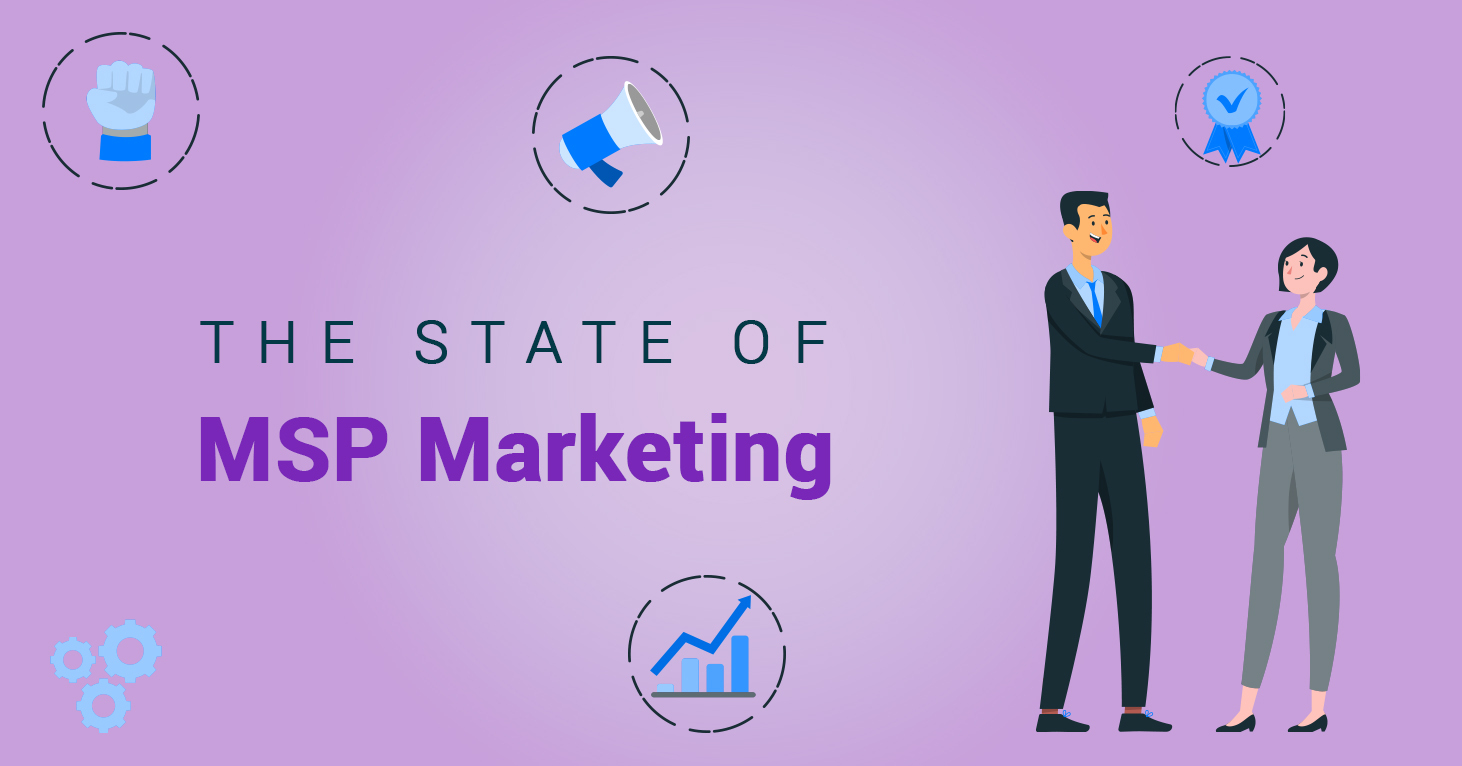
It is an exciting time for the global Managed Service Provider or MSP industry. According to Statista, the managed services market was valued at around $186 billion in size in 2019, with forecasts suggesting that this number could grow to $356.24 billion by 2025.
As the CEO of an MSP marketing company, I can tell you firsthand that there is plenty of opportunities out there for MSPs. However, you do need to be fully prepared with the right MSP marketing strategies and resources to take full advantage of this growth opportunity.
Let’s see how.
What is the Difference between MSP Sales and MSP Marketing?
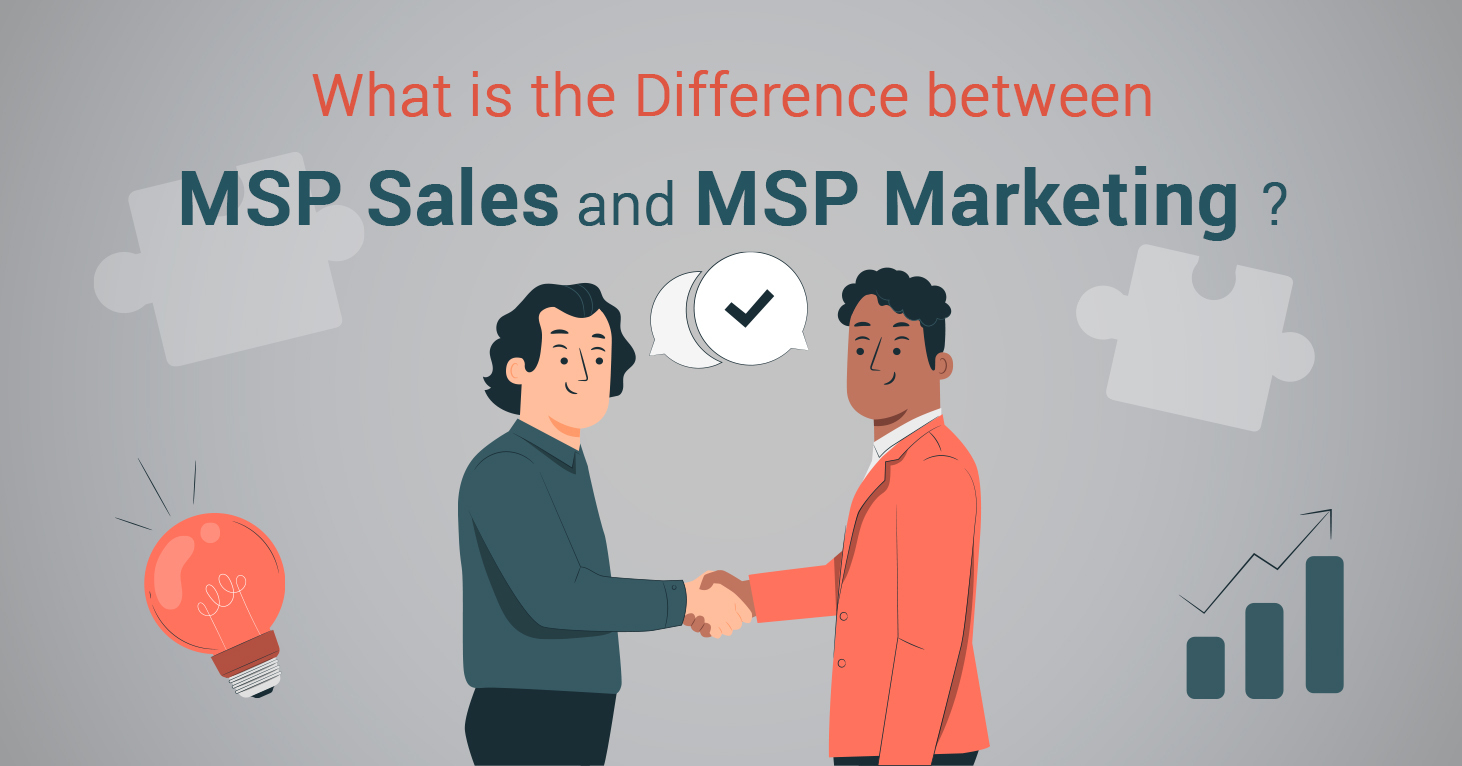
While the two topics are closely related, marketing for managed services providers is about a whole lot more than just selling services. In fact, if you’re properly marketing your managed services provider, you really shouldn’t be selling anything at all.
That’s because MSP marketing is all about building trust.
When you’re marketing your managed services offering, by definition, you’re talking to people who are not ready to be sold to yet. The audience of people who are “marketing qualified” may or may not have ever heard of you, and most definitely do not need to find out about the intricate and technical details of what your services can do.
What they need to find out as much about as possible, and what your MSP marketing should be built to do, involves outlining what those services can do for them.
In other words, marketing for MSPs should be focused on communicating the raw value that you provide, so that your prospect gets to the point that they ARE ready to start hearing those details, and you can move onto the next step in your customer acquisition process – sales.
Why Do You Need MSP Marketing?
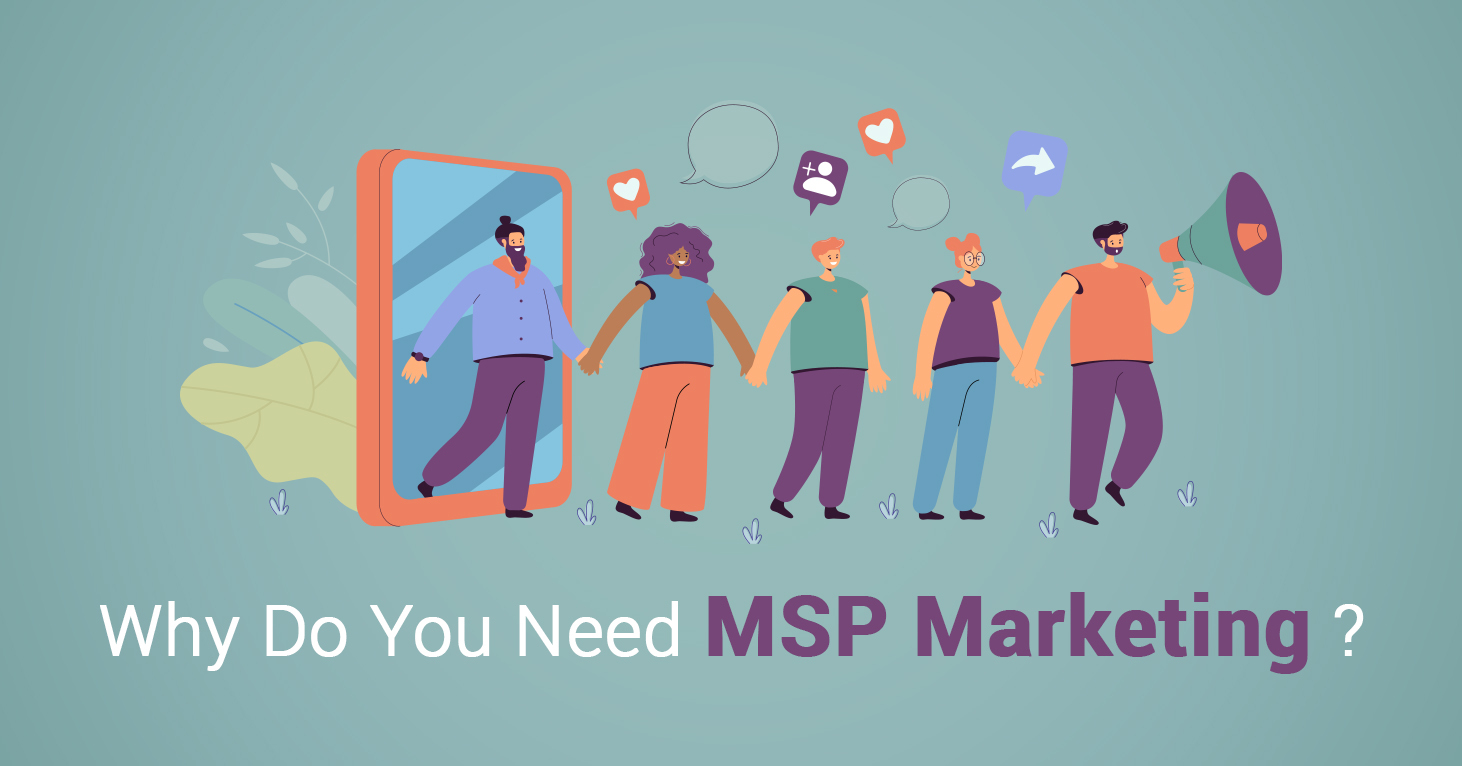
Even in an increasingly digital world, word-of-mouth still offers a great way to get new leads, which is what most MSPs prefer. Referrals from real-life clients help new leads trust your MSP IT services naturally. However, word-of-mouth alone is often not enough to grow your business beyond a limit.
As an MSP service provider, if you want to actively grow your business in a planned and predictable manner, you need to be marketing in some form or another. That’s where a functional and technology-based MSP marketing plan comes in.
Also, with the sheer amount of competition in most geographic regions, it helps to take advantage of social media and other online channels to boost your brand presence. With the majority of MSPs using Facebook and LinkedIn daily to promote their business, you don’t want to be left behind.
How to Develop a Robust MSPs Marketing Strategy
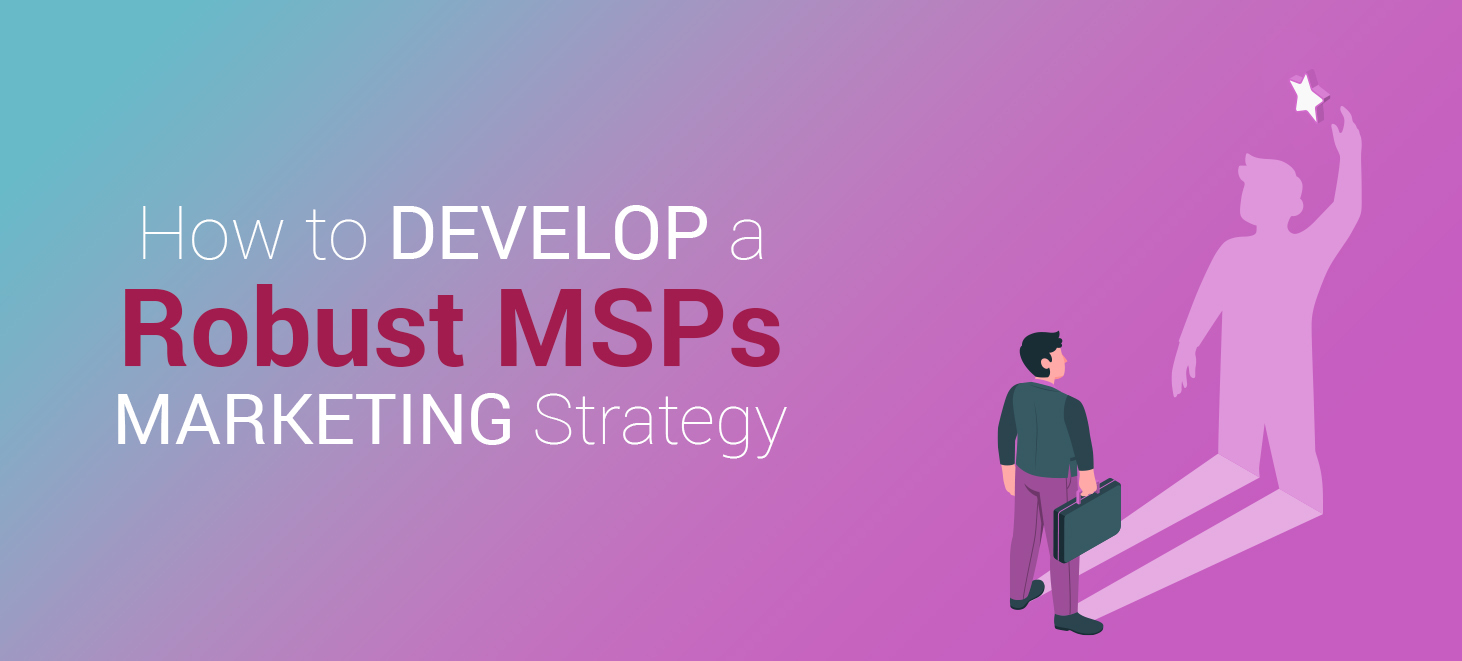
To stand out in the market and attract valuable clients, a robust marketing strategy is essential. You can start to develop yours by following these steps:
-
Define Your Target Audience: Understanding your ideal customer is the cornerstone of any successful marketing strategy. Identify the industries, company sizes, and pain points that align with your MSP’s expertise and services.
-
Craft Your Value Proposition: Clearly communicate the unique value your MSP offers to potential clients. Whether it’s cost-effective solutions, round-the-clock support, or cutting-edge technology, your value proposition should resonate with your target audience.
-
Build a Strong Online Presence: Establishing a professional website and active presence on social media platforms is crucial for showcasing your MSP’s capabilities. Regularly update your website with informative content, case studies, and client testimonials to demonstrate your expertise.
-
Content Marketing: Develop a content marketing strategy focused on providing valuable insights and solutions to your target audience’s challenges. Create blog posts, whitepapers, eBooks, and videos that address common IT issues and showcase your MSP’s expertise.
-
Search Engine Optimization (SEO): Optimize your website and content for search engines to improve your visibility online. Perform keyword research to pinpoint pertinent terms and phrases sought by your intended audience, then integrate them into your content.
-
Paid Advertising: Consider investing in pay-per-click (PPC) advertising on platforms like Google Ads to increase your MSP’s visibility and generate leads. Target specific keywords and demographics to reach potential clients actively seeking IT services.
-
Email Marketing: Nurture leads and maintain client relationships through targeted email campaigns. Send out newsletters, updates on industry trends, and special promotions to keep your audience engaged and informed.
-
Networking and Partnerships: Attend industry events, join professional associations, and forge partnerships with complementary businesses to expand your MSP’s reach and credibility. Networking with peers and potential clients can lead to valuable referrals and collaborations.
-
Track and Analyze Results: Monitor the performance of your marketing efforts using analytics tools to identify what strategies are driving the most leads and conversions. Continuously refine your approach based on data to optimize your ROI.
-
Customer Experience and Retention: Providing exceptional customer service is key to retaining clients and fostering long-term relationships. Prioritize client satisfaction, actively solicit feedback, and address any issues promptly to build trust and loyalty.
MSP Marketing Phrases & Terminologies You Should Know
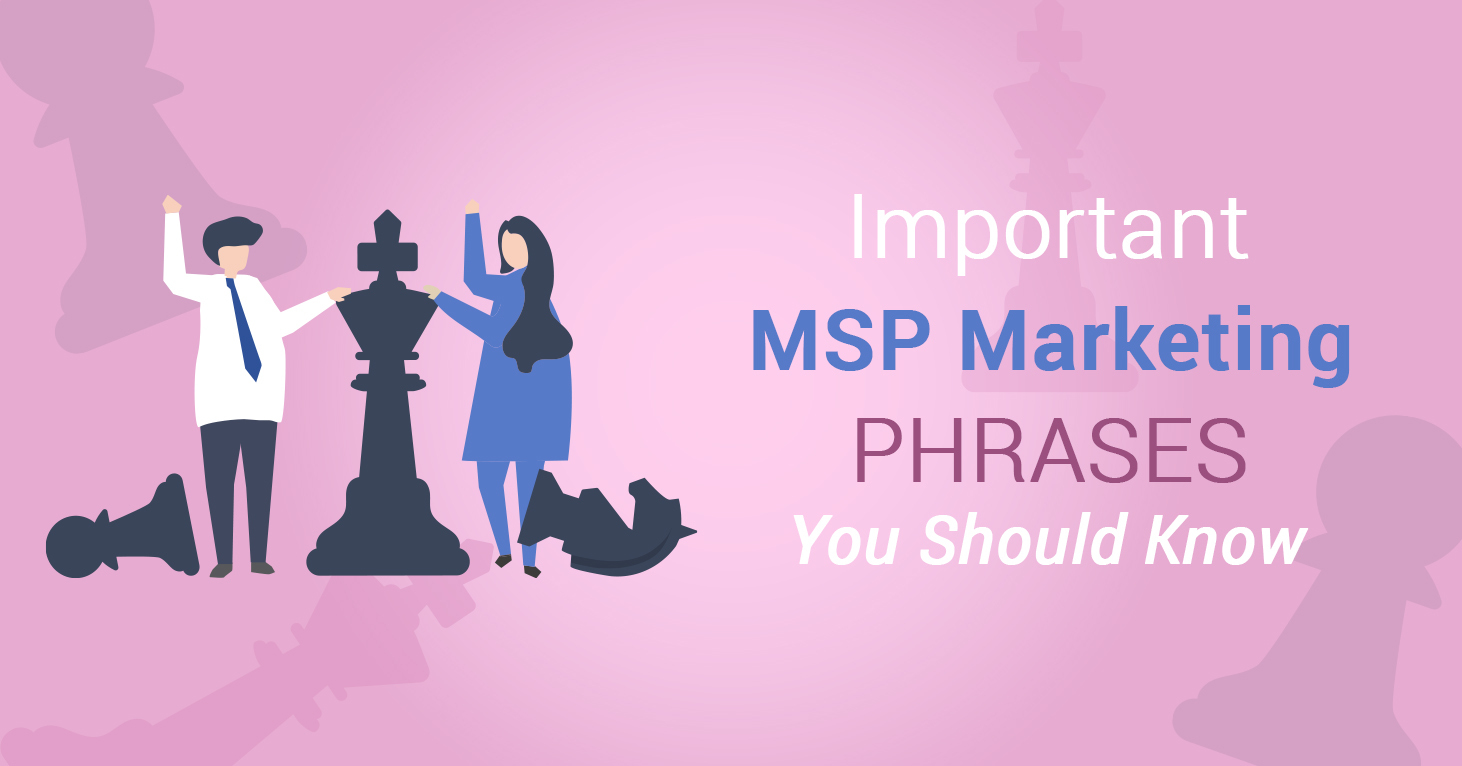
Now, as it is clear why you need to invest in MSP marketing, let’s check out some of the common terminologies and phrases associated with it.
- MSP Inbound Marketing: It is an MSP digital marketing process that involves creating valuable and informative content and promoting it across various digital channels to generate new leads. However, it focuses on creating content that resonates with the audience and solves their problems.
- MSP Outbound Marketing: In this type of marketing, an MSP service provider usually promotes their services to everyone without knowing if they would be a qualified lead. Almost all of the traditional marketing methods like cold calling and TV commercials fall under this category.
- MSP Email Marketing: It is a marketing process that involves using email to send marketing messages such as advertisements, sales solicitations, and any other business requests.
- Leads: A lead can be an individual or an organization that is likely to be interested in buying what you are offering, which in this case, are your MSP IT services.
- Lead Generation: Lead generation is the process of identifying, cultivating and converting a lead into a sale.
- Call to Action: In marketing, a call to action or CTA is a marketing message that intends to generate an immediate response from a potential customer.
-
Here are some examples of common CTAs for MSPs.
- Schedule an appointment
- Register for demo
- Get started
- Follow us
- Contact us
- Sign up for webinar
- Get the ebook
- Read the article
- Learn more
- Complete the signup form
- Watch the video
- Subscribe here
- Read the blog
- Find out more
- Try it
- Schedule a strategy call
- Complete the survey
-
-
Landing Page: A landing page is a webpage specifically created for a marketing campaign, be it a short term or long term campaign.
-
B2B: B2B in MSP marketing refers to “business-to-business” interactions, where a Managed Service Provider (MSP) offers its services to other businesses rather than individual consumers. In this context, MSP marketing strategies are tailored to appeal to the needs, challenges, and decision-making processes of businesses that may require managed IT services.
-
Target Audience: Focusing on businesses of various sizes, from small and medium-sized enterprises (SMEs) to large corporations that need managed IT services.
-
Conversion: For Managed Service Providers, this means the process of guiding a business from the initial point of contact or awareness through various stages of engagement until they sign up for IT services.
-
Evergreen: Refers to content or strategies that remain relevant and valuable over time, regardless of current trends or news. Evergreen content is not time-sensitive; it continues to attract traffic, generate leads, and help with conversions long after it’s first published. This is opposed to time-bound content that might relate to specific events, product launches, or seasonal topics.
-
Lead Nurturing: Lead nurturing in MSP marketing is the process of developing relationships with potential clients at every stage of the sales funnel and throughout the buyer’s journey. It involves carefully planned engagement with leads—businesses that have shown some interest in your managed IT services—with the goal of converting them into customers when they are ready to make a purchasing decision.
-
Marketing Funnel: It is a model that illustrates the journey potential customers take from first becoming aware of your MSP business to ultimately making a purchase decision. In MSP marketing, the funnel is particularly important because the buying cycle is often longer and more complex than in B2C scenarios, involving multiple touchpoints and decision-makers.
-
Brand Identity: Brand identity in MSP marketing encompasses the visual, verbal, and emotional attributes that define your Managed Service Provider business and differentiate it from competitors. It’s not just about the logo or color scheme; it’s the comprehensive set of elements that come together to create a consistent image and experience for your clients and prospects.
Key components of brand identity for an MSP include:
-
Logo and Design Elements: Your logo, color palette, typography, and other design elements should be distinctive and reflect the professional nature of your services. These elements should be used consistently across all marketing materials and digital platforms.
-
Brand Voice and Messaging: The way your MSP communicates, including the tone, language, and key messages, should align with your brand personality, whether it’s professional, friendly, innovative, or customer-centric.
-
Core Values and Mission Statement: Clearly defined core values and a mission statement help convey what your MSP stands for and what clients can expect when they choose to work with you.
-
Brand Story: Create a compelling narrative about the origins, evolution, and vision of your MSP. A strong brand story can resonate with clients and create an emotional connection.
-
Service Proposition: Define what makes your MSP unique in terms of the services you offer, the customer experience you provide, and the benefits clients receive. This should be prominently featured in your marketing efforts.
-
Marketing Materials: Ensure that your brochures, business cards, email signatures, and other marketing materials reflect your brand identity and convey a consistent image.
-
Online Presence: Your website, social media profiles, and any digital content should all reflect your brand identity to provide a cohesive user experience that reinforces your brand’s values and offerings.
-
Customer Experience: Every interaction clients have with your MSP, from the sales process to support and service delivery, should reflect your brand identity and promise.
-
Employee Advocacy: Encourage your team to embody the brand identity in their interactions with clients and within the industry, as they are representatives of your brand.
-
Consistency: Maintain consistency in all aspects of your brand identity across various channels and touchpoints. This helps build recognition and trust with your target audience.
-
-
Value Proposition: A value proposition in MSP marketing is a clear statement that explains how your Managed Service Provider (MSP) meets the needs of your clients, the specific benefits you offer, and how you differentiate from the competition. It’s essentially the core reason a potential client should choose your services over another provider. A strong value proposition is succinct, compelling, and speaks directly to the client’s challenges and goals.
-
Organic Traffic: Organic traffic refers to visitors who come to your website from unpaid search engine results. It is one of the most valuable forms of traffic for MSPs because it indicates that potential clients are finding your website by searching for relevant keywords or phrases related to managed IT services. Unlike paid traffic, which comes from advertising, organic traffic is generated through effective search engine optimization (SEO) and providing high-quality content that search engines deem valuable for users.
-
Authority Building: Establishing your MSP as a thought leader through publishing insightful articles and participating in industry discussions can lead to higher search rankings and, consequently, increased organic traffic.
-
Local SEO: For MSPs serving specific geographical areas, local SEO is crucial. This includes optimizing for local keywords, creating a Google My Business listing, and encouraging customer reviews to improve visibility in local search results.
What is Included in an MSP Marketing Plan?
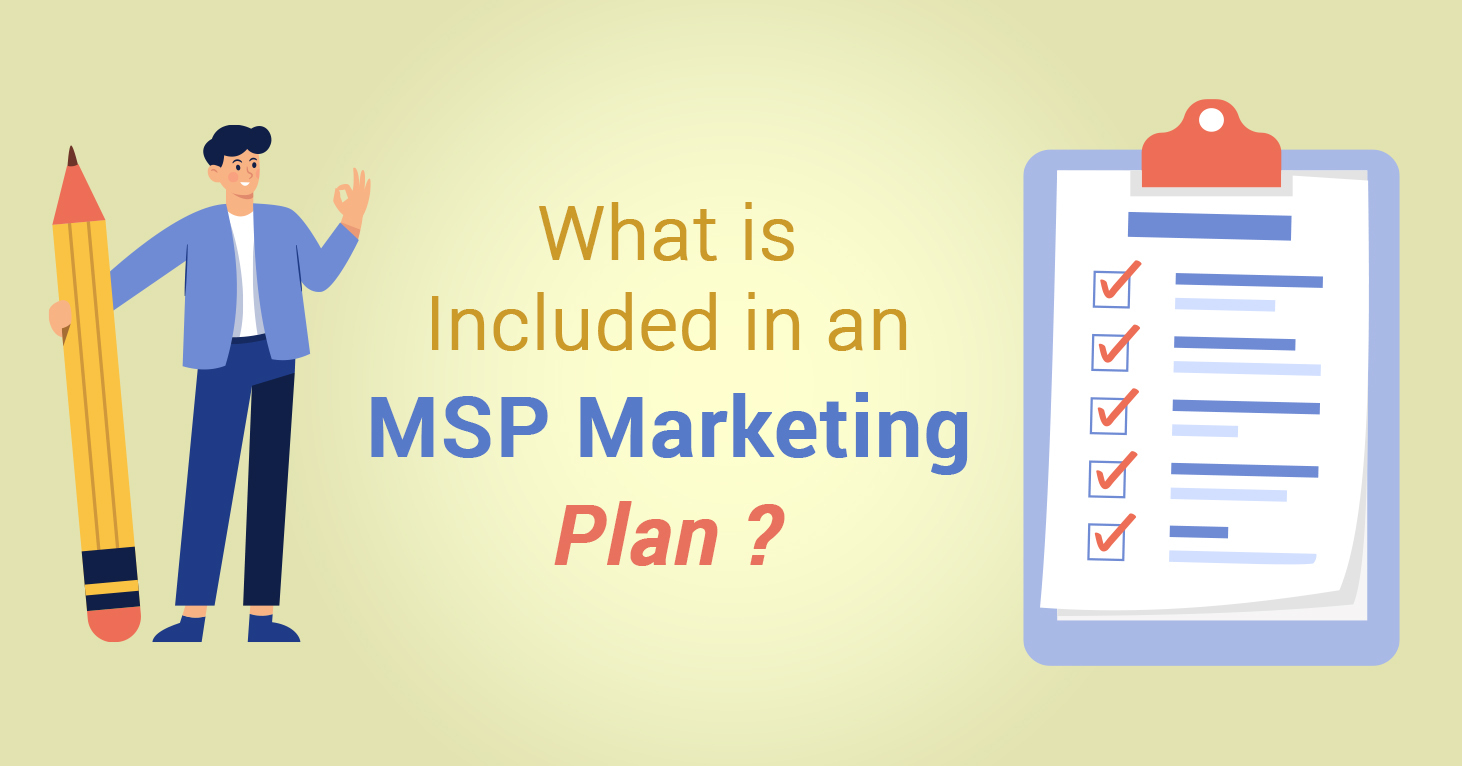
An MSP marketing plan is essentially a detailed blueprint guiding a Managed Service Provider (MSP) in its efforts to draw in, captivate, and transform prospects into dedicated clients. It specifies the precise measures, instruments, and resources an MSP will employ to market its offerings and fulfill its ambitions for business expansion. Your MSP marketing plan’s goals should include specific targets for tracking interest, what works, what doesn’t, and other factors.
This type of marketing plan is fundamentally structured around two key components: strategy and tactics.
Your MSP marketing strategy lays out exactly who you are targeting with your marketing, and the message you want to send to them. When you define your strategy you’ll want to answer questions like:
- Who is my ideal customer?
- What are the big problems that they face in terms of their IT?
- What solutions do I have that align with those problems?
- What channels can I use to reach them?
- What makes my MSP uniquely qualified?
To do this, you’ll need to know your own business inside and out, but more than that, you’ll need to know your customer even better.
The tactics, which we’ll overview in the next section, are the actual marketing techniques that you can employ to accomplish the goals set out in your strategy.
How To Correctly Implement Cohesive MSP Marketing
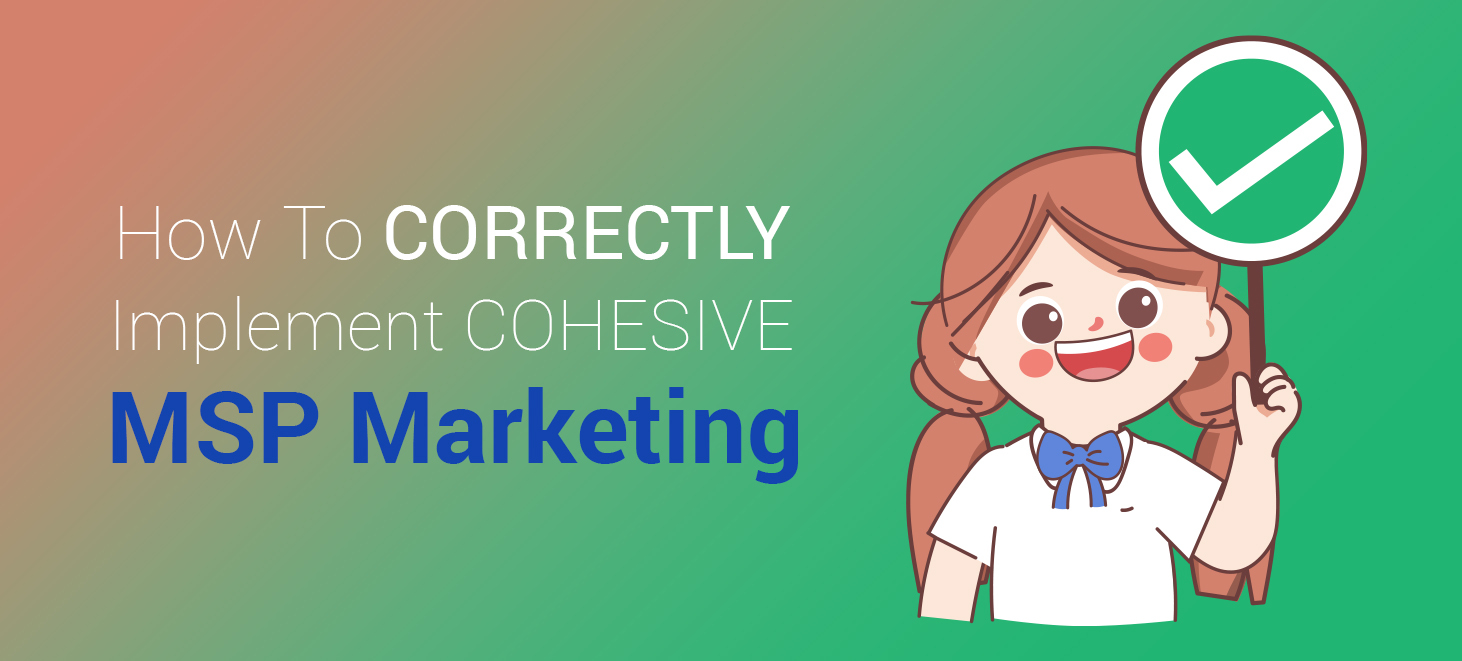
Implementing a cohesive marketing strategy is essential for ensuring that all aspects of your MSP’s marketing efforts work together seamlessly to achieve your business goals.
-
Develop a Comprehensive Marketing Plan: Start by creating a detailed marketing plan that outlines your goals, target audience, messaging, channels, and tactics. Having a clear roadmap will help ensure that your marketing efforts are aligned and cohesive.
-
Establish Consistent Branding: Maintain consistent branding across all marketing channels and materials, including your website, social media profiles, email communications, and printed materials. Consistent branding helps reinforce your MSP’s identity and build brand recognition.
-
Integrate Your Marketing Channels: Coordinate your marketing efforts across multiple channels, including online and offline channels. For example, integrate your website, social media, email marketing, and offline events to create a unified and cohesive experience for your audience.
-
Create Relevant and Valuable Content: Develop content that is relevant to your target audience’s needs and interests. Whether it’s blog posts, whitepapers, case studies, or videos, ensure that your content provides value and addresses your audience’s pain points.
-
Utilize Marketing Automation: Implement marketing automation tools to streamline your marketing processes and ensure consistency across all channels. Automation can help you schedule and distribute content, track interactions with prospects, and nurture leads more effectively.
-
Segment Your Audience: Divide your audience into segments based on demographics, behaviors, or interests, and tailor your marketing messages accordingly. Personalizing your marketing efforts based on audience segments helps increase relevance and engagement.
-
Monitor and Measure Results: Continuously monitor the performance of your marketing campaigns and measure key metrics to evaluate their effectiveness. Use analytics tools to track website traffic, engagement, lead generation, and conversion rates, and adjust your strategy based on data-driven insights.
-
Align Sales and Marketing Efforts: Foster collaboration between your sales and marketing teams to ensure that they are working towards common goals and objectives. Aligning sales and marketing efforts helps streamline the lead generation and conversion process and improves overall efficiency.
-
Stay Agile and Flexible: The marketing landscape is constantly evolving, so be prepared to adapt your strategy as needed. Stay informed about industry trends, changes in consumer behavior, and emerging technologies, and be willing to adjust your approach accordingly.
-
Continuously Improve: Regularly evaluate your marketing efforts and identify areas for improvement. Solicit feedback from your team, clients, and prospects, and use this feedback to refine your strategy and tactics over time.
By following these steps and implementing a cohesive marketing strategy, you can effectively promote your MSP’s services, attract new clients, and drive business growth. Remember to stay focused on your target audience’s needs and preferences and strive for consistency and alignment across all marketing channels and efforts.
What Marketing Tactics are Available to MSPs?
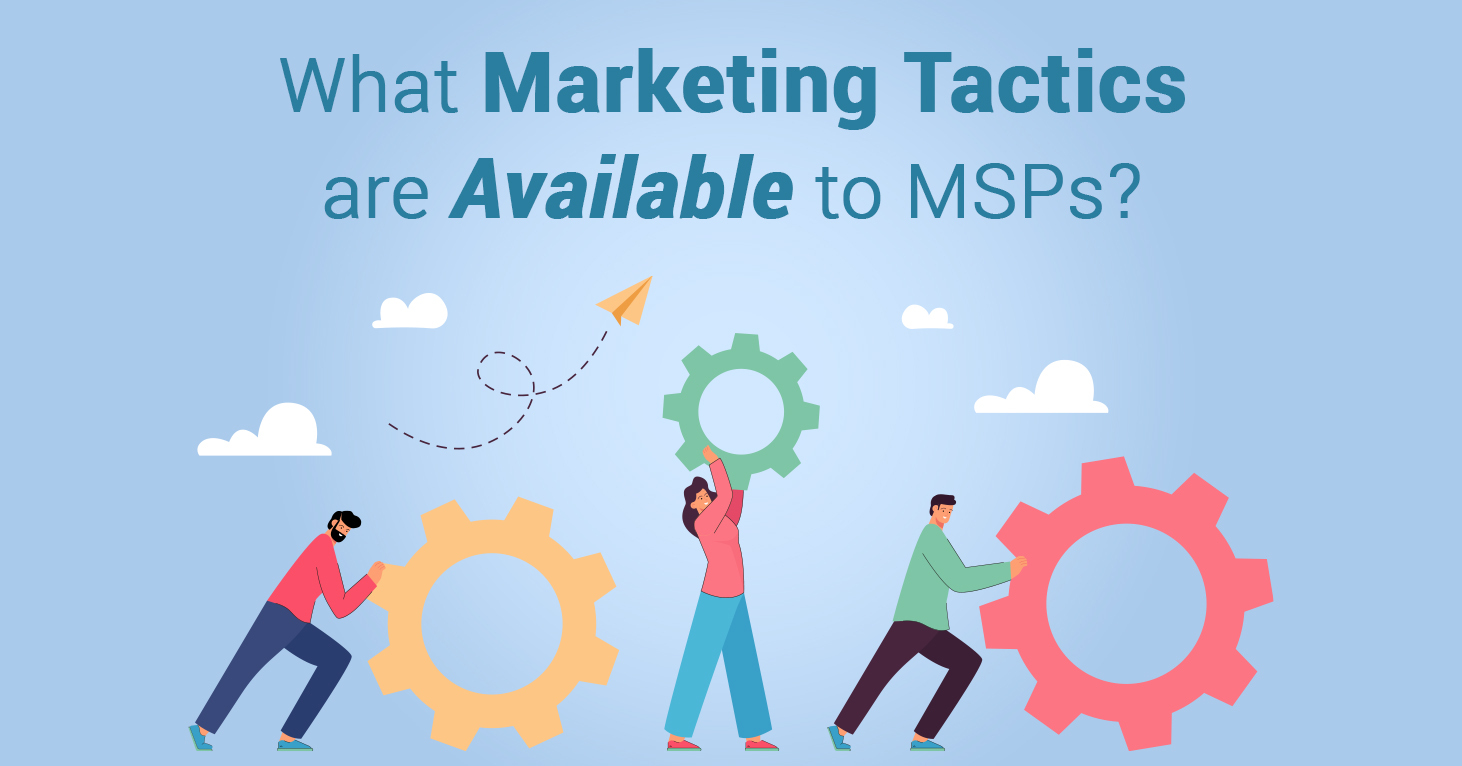
If you’re active in the IT channel, you’ve surely heard about many of the wide range of different techniques that are making waves across the industry today. Whether you’re talking about “old school” digital tactics like PPC or SEO or the “new wave” of lead generation techniques like content marketing, and LinkedIn all of them are more than worth exploring for their own unique and fascinating reasons.
1. Pay-Per-Click (PPC)
Also commonly referred to as PPC, pay-per-click is a time-honored digital marketing technique that allows an MSP like yourself to pay a publisher (usually through Google or Bing’s network) every time one of your ads is clicked. For a business as tech-based as yours, PPC is a great technique to target leads at the middle of the sales funnel – namely, those in the “consideration” stage who are doing their buying research at that very time.
As an MSP, no one can guarantee that paid search ads are going to work for your specific business – you’ll have to figure that out on your own – but it can’t be denied that PPC in general is a very cost effective way to make a quality first impression. One study estimates that for everyone $1 someone spends on PPC advertising in AdWords, they can expect to generate about $2 in income as a result.
2. Search Engine Optimization (SEO)
SEO is all about getting your MSP’s website to rank as highly as possible in search results for keywords that are relevant to your industry. When you consider that a massive 93% of all online interactions still begin with a search engine like Google, it’s easy to see why this is such a good idea.
But more important is the fact that 70% of the links that search users click on are organic – meaning that most people skip the paid ads and go right to the native results. So anybody that you can’t get with PPC, you can usually pick up with SEO.
3. Content Marketing
As an MSP, your audience is naturally savvier than most. You need to build a relationship with them before you can ask them to make a purchase and to do that, you need quality content – and lots of it.
Content marketing involves the creation of everything from blog posts to white papers to Infographics, all in an effort to “warm up” your leads over time in an effort to get them ready to make the purchase you’re about to ask them for. One study estimated that content marketing is a perfect opportunity to generate three times the number of leads as compared to traditional “outbound” methods, all at a cost of about 62% less. So this is yet another chance to really get the most “bang” for your “buck”, so to speak.
But keep in mind that you shouldn’t just be creating content for your own blog. For the best results, write guest posts for other relevant businesses or thought influencers in your industry. This is a great way to both establish yourself as an authority and get entirely new sets of eyes focused in your direction, too.
4. Email Marketing
Email marketing is a particularly important topic for MSPs because of how it enables you to not only generate more leads, but to do so in a way that helps support the long-term health and growth rate of your organization.
According to one recent study, about 80% of marketing professionals say that email marketing is a major component of their customer acquisition and retention efforts. Likewise, if you’re email marketing is done right, for every $1 you spend, you can usually expect to generate about $38 in revenue as a return.
But again: don’t just limit your efforts to your existing email list. Reach out to new prospects via email as well to have a genuine shot at starting a long lasting, meaningful conversation.
5. Social Media Marketing
There’s a reason why more and more B2B industries are moving towards social media marketing: it doesn’t just work, it works incredibly well. It’s an opportunity to generate new leads and reaffirm your relationship with existing prospects at the same time.
But keep in mind, you shouldn’t just be using Facebook and Twitter to your MSP’s advantage. LinkedIn’s 500 million users could be equated to the world’s largest networking event, and is another in a long line of opportunities to tap into a B2B audience that is spending more and more time online.
6. Online Reviews
Another way to strengthen your online presence while maintaining your online reputation is online reviews. For managed IT services providers, online reviews work as the digital equivalent of traditional word-of-mouth. They also help improve your SEO.
In this digital world, 82% of consumers read online reviews for local businesses, with 52% of 18-54-year-olds saying they always read reviews. The average consumer reads ten reviews before feeling able to trust a business.
Start with your existing customers. You can ask them to leave a review on your website or one of your social media channels or your Google My Business page. You can send a link through email to add a review.
However, don’t offer anything in exchange for a good review because Google and other review sites don’t take kindly to solicited customer reviews. Also, respond to all reviews, including the negative ones.
7. Lead Tracking
Lead tracking has to be a part of your MSP marketing plan as it allows you to identify and document your leads based on their pain-points. In other words, you get to create personalized MSP marketing strategies based on your lead tracking data. With personalization on the rise, this is the right way to turn leads into customers.
In MSP digital marketing, keeping track of the online activity of each potential buyer is the best way to capture lead information. The most common classification of leads is into the following three categories.
- Marketing Qualified Lead (MQL) – These are the leads that have had some interaction with your MSP marketing materials and content. They present a good lead nurturing opportunity.
- Sales Accepted Lead (SAL) – These are MQLs who your sales team has flagged as most likely buyers. So, nurturing them further can help you close in on the sale.
- Sales Qualified Lead (SQL) – These are the SALs whom your sales and marketing team has vetted as and considered ready for the next stage in the sales process.
8. Search Engine Marketing
It is not the same as SEO or PPC. Search Engine Marketing (SEM) focuses primarily on using paid advertisements such as PPC and social media marketing to improve the search engine visibility of your website. It combines the best of SEO and paid online advertisements, which with the right placement, can increase the chances of a sale.
In other words, instead of using social media marketing, PPC, and SEO in silos, you should use them together as one strategy under SEM. When creating your MSP marketing plan, find a way to consolidate all your online marketing tactics with each other to get better results. However, if you don’t have the budget for SEM, you can continue to focus on SEO and PPC alone until you are ready to take the next step.
9. MSP Website Development
You also need to pay special attention to your MSP website development. The following factors will play a critical role in developing a website that converts visitors into customers.
- Responsive Design – Your entire website, including the media, needs to be responsive so that people can access it from any device, be it mobile or laptop.
- Fast Loading – Speed is a critical factor because even a 100-millisecond delay in website load time can hurt conversion rates by 7%. The longer it takes to load your website, the less likely are people to browse it again.
- Call-To-Actions – With the carefully placed call-to-actions, you can ask your potential customer to take the desired action, and then convert them into sales.
- No Tech Jargon – You may like to flaunt your technical expertise, but your potential customer may not be as tech-savvy as you are. As a result, using too much technical jargon is likely to put them off. So, use simple terms and short paragraphs.
- Contact Details – Make sure your contact details, ideally email and phone number, are visible on every page.
- SEO Optimized – From Meta description to keyword-optimized content, your website needs to be SEO optimized to increase its online visibility.
10. Other Opportunities
Another opportunity you’ll definitely want to explore as an MSP is a lead magnet – that is, some type of promotion or offer that gets people A) interested in your brand, in a way that B) also gets them to give you their contact information in a way that allows you to grow your larger email and contact lists.
So say you write a long eBook about how to pick the right MSP. You can offer that for free as a lead magnet, provided that people give you their email address or sign up for your email list. You’ve just generated a new lead AND have accurate contact information to work from, allowing you to use other techniques to finesse that relationship moving forward.
Remarketing is invaluable for similar reasons. This is a technique that lets you position targeted ads in front of an audience of people who have previously visited your site, but who didn’t take a desired action like signing up for your email list or contacting you for more information. You already know these people are interested in who you are and what you offer as an MSP – it would be a shame to let that information go to waste.
Finally, make sure that you’re either attending industry-specific events in your area or speaking at them whenever you have the chance to do so. Speaking at industry events is great, as you’ve got a room full of people who could use help from a businesses like yours and all of their eyes are focused on the same thing: you. Not only can you make an incredible first impression, but by being in the room with them you’re also in a position to start a genuine, organic “real life” connection that will serve you both well for years to come.
MSP Marketing Best Practices
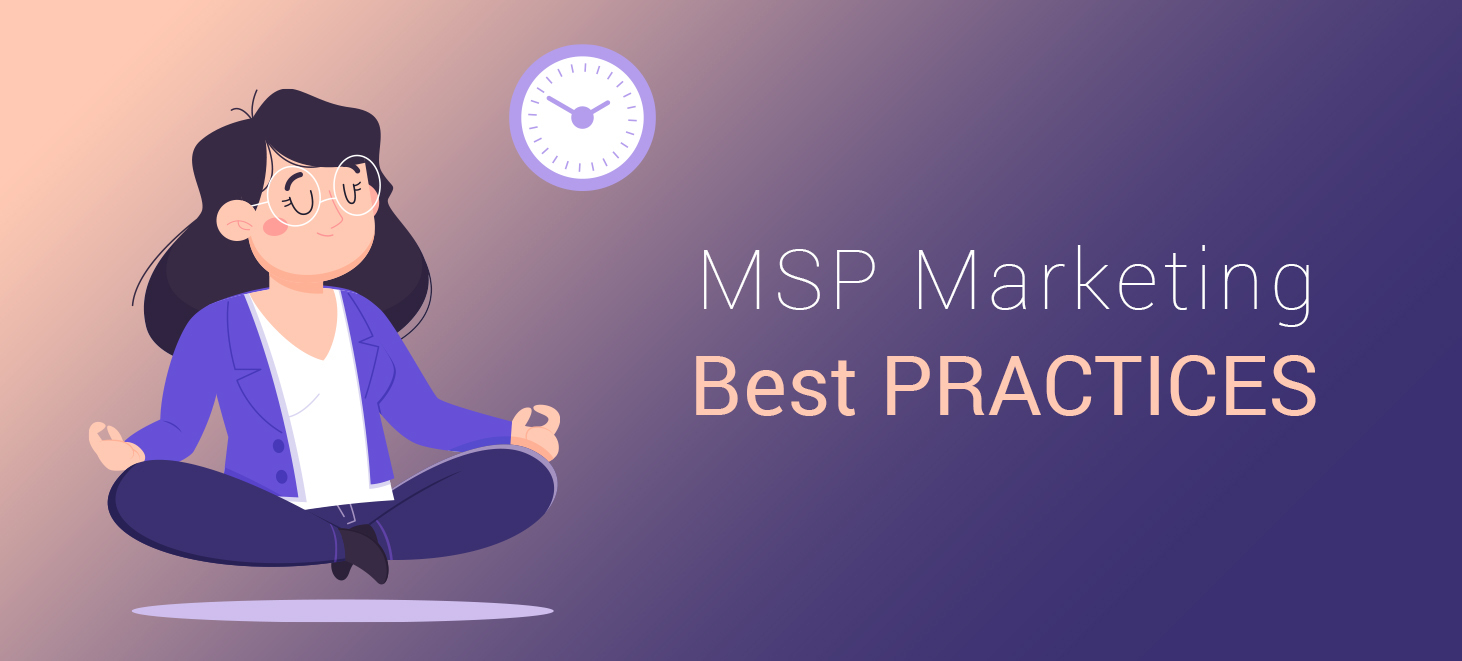
-
Specialize and Differentiate: Identify a niche or specialty within the MSP market and position yourself as an expert in that area. Whether it’s cybersecurity, cloud services, or industry-specific solutions, specializing can help you stand out from the competition.
-
Focus on Education and Thought Leadership: Use your marketing channels to educate your audience about industry trends, best practices, and emerging technologies. Establishing yourself as a thought leader builds trust and credibility with potential clients.
-
Prioritize Relationship Building: In the B2B world, relationships matter. Focus on building genuine connections with your prospects and clients through personalized communication, networking events, and one-on-one meetings.
-
Offer Free Value: Provide valuable resources such as whitepapers, webinars, and assessments to prospects at no cost. This demonstrates your expertise and willingness to help, making prospects more likely to choose your MSP when they’re ready to invest.
-
Utilize Case Studies and Testimonials: Showcase your past successes through case studies and client testimonials. Highlighting real-world examples of how your MSP has helped clients overcome challenges can be a powerful selling tool.
-
Stay Active on Social Media: Engage with your audience on social media platforms such as LinkedIn, Twitter, and Facebook. Share industry news, insights, and updates about your MSP to keep your brand top of mind.
-
Invest in Quality Content: Content is king in the digital age. Invest in creating high-quality content that resonates with your target audience. This could include blog posts, videos, infographics, and podcasts.
-
Optimize Your Website for Conversions: Ensure that your website is user-friendly, mobile-responsive, and optimized for conversions. Use clear calls-to-action and lead capture forms to encourage visitors to take the next step.
-
Monitor and Measure Your Results: Track the performance of your marketing campaigns using analytics tools. Recognize what is effective and where enhancements can be made, and adapt your strategy accordingly.
-
Stay Up-to-Date with Industry Trends: The technology landscape is constantly evolving. Stay informed about the latest trends, innovations, and changes in the MSP industry so you can adapt your marketing strategy accordingly.
Challenges in MSP Marketing
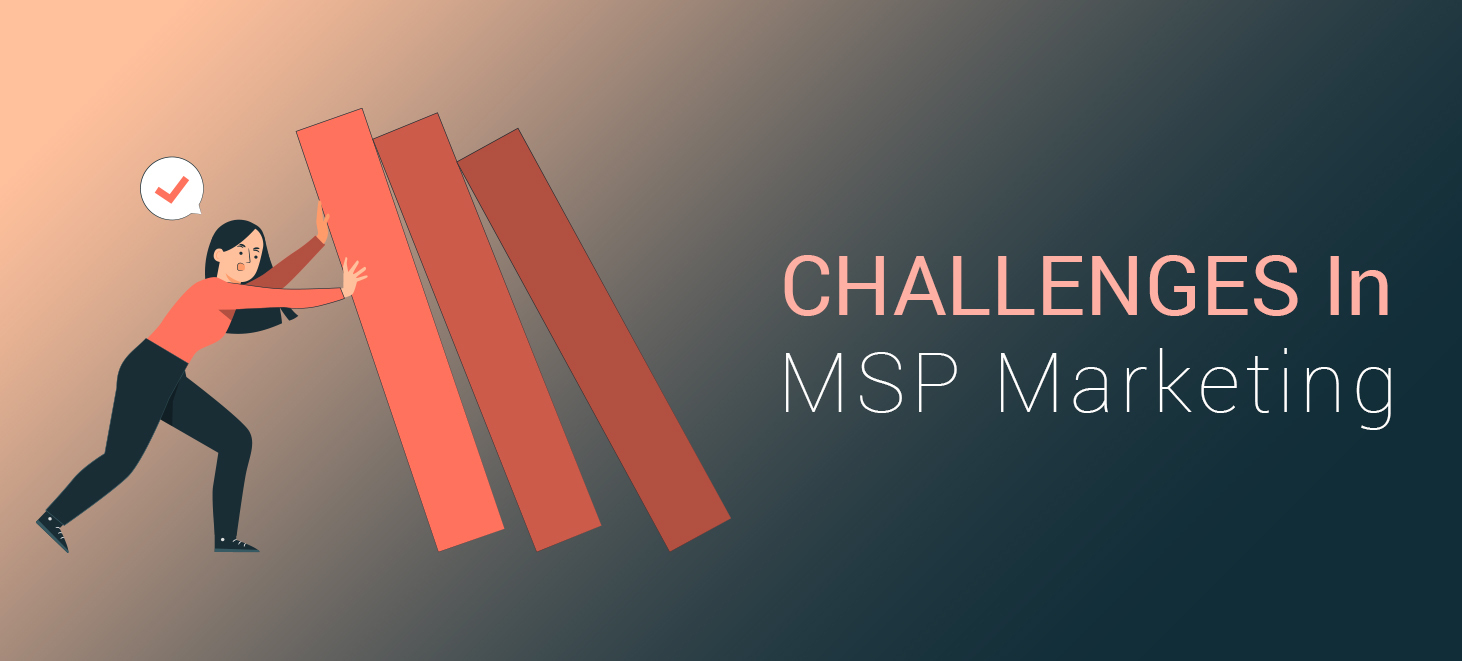
-
Highly Competitive Landscape: The MSP market is highly saturated, making it challenging for new and existing providers to differentiate themselves from competitors.
-
Educating Prospects: Many businesses may not fully understand the value of managed services or the benefits of outsourcing their IT needs. Educating prospects about the importance of MSPs can be a significant hurdle.
-
Building Trust: Trust is crucial in the MSP-client relationship, particularly when it comes to handling sensitive data and critical IT infrastructure. Building trust with potential clients can take time and effort.
-
Demonstrating ROI: Quantifying the return on investment (ROI) of MSP services can be difficult for some businesses. Convincing potential clients that investing in managed services will save them time and money in the long run can be a challenge.
-
Keeping Up with Technology Trends: The rapid pace of technological advancements means that MSPs must constantly stay updated with the latest trends and innovations. Keeping pace with emerging technologies can be both time-consuming and costly.
-
Balancing Marketing and Service Delivery: Many MSPs struggle to find the right balance between marketing their services and delivering quality service to existing clients. Overcommitting to marketing efforts can lead to neglecting client needs, while focusing solely on service delivery may result in missed opportunities for growth.
-
Measuring Marketing ROI: Determining the effectiveness of marketing campaigns and attributing leads and conversions to specific efforts can be challenging for MSPs. Without accurate measurement tools in place, it’s difficult to know which marketing strategies are driving results.
-
Limited Resources: Small and medium-sized MSPs may have limited resources, including budget, manpower, and time, to devote to marketing efforts. Finding cost-effective ways to market their services without sacrificing quality can be a struggle.
-
Adapting to Changes in the Market: The MSP landscape is constantly evolving, with new technologies, regulations, and market trends emerging regularly. MSPs must be agile and adaptable to navigate these changes and adjust their marketing strategies accordingly.
-
Client Retention: While attracting new clients is important, retaining existing clients is equally critical. MSPs must continuously demonstrate value to their clients to ensure long-term satisfaction and loyalty.
What MSP Marketing Is Not: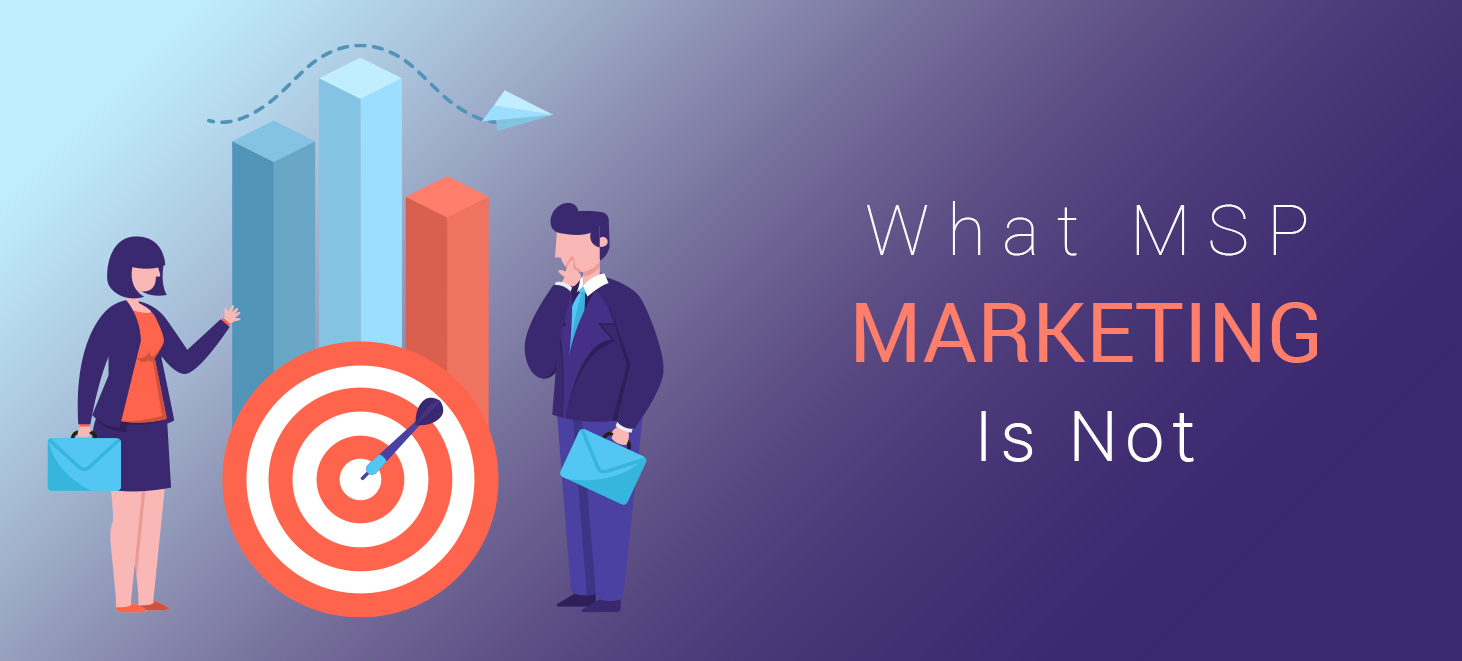
Your definition for MSP marketing may vary depending on who you talk to, but an important part of that will be understanding what it isn’t.
-
Not a Sales Strategy: Marketing should not be confused with or replace the sales cycle; it’s not about being pushy or salesy.
-
Not Advertising: Advertising is a single tactical element, whereas marketing is a comprehensive strategic approach that integrates various forms of communication.
-
Not Customer Success: Marketing’s role is to attract and convert leads, not to ensure client success post-sale—that falls under customer service and account management.
-
Not About Referrals: While valuable, referrals are a part of the sales process and not the primary focus of marketing efforts.
How MSP Marketing Differs from Other Industries:
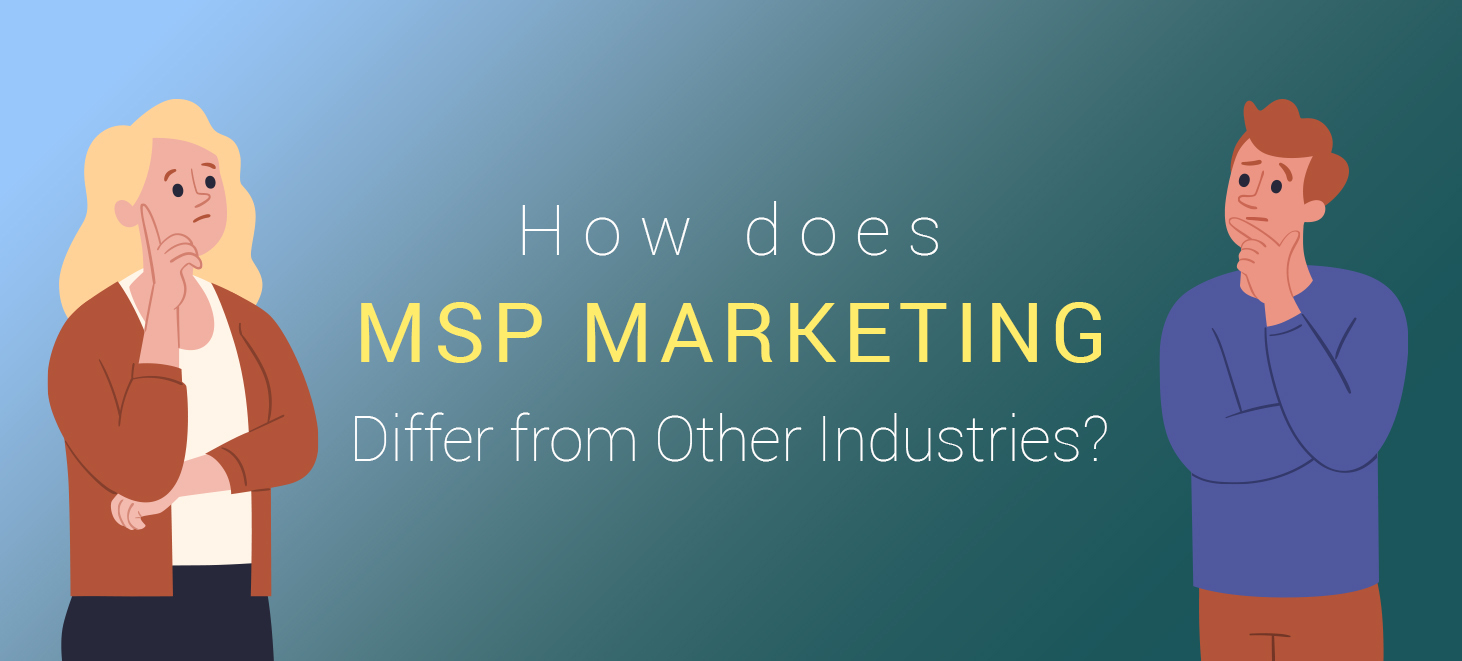
-
B2B vs. B2C: MSP marketing is B2B (business-to-business), targeting other businesses rather than individual consumers.
-
Relationship Building: It requires more emphasis on developing long-term relationships compared to B2C marketing.
-
Illustrating ROI: B2B marketing for MSPs involves demonstrating the return on investment to business clients, which is often more detailed and complex.
-
Solving Business Problems: MSP marketing is solution-focused, addressing specific business IT challenges rather than offering quick fixes.
The Future of MSP Marketing
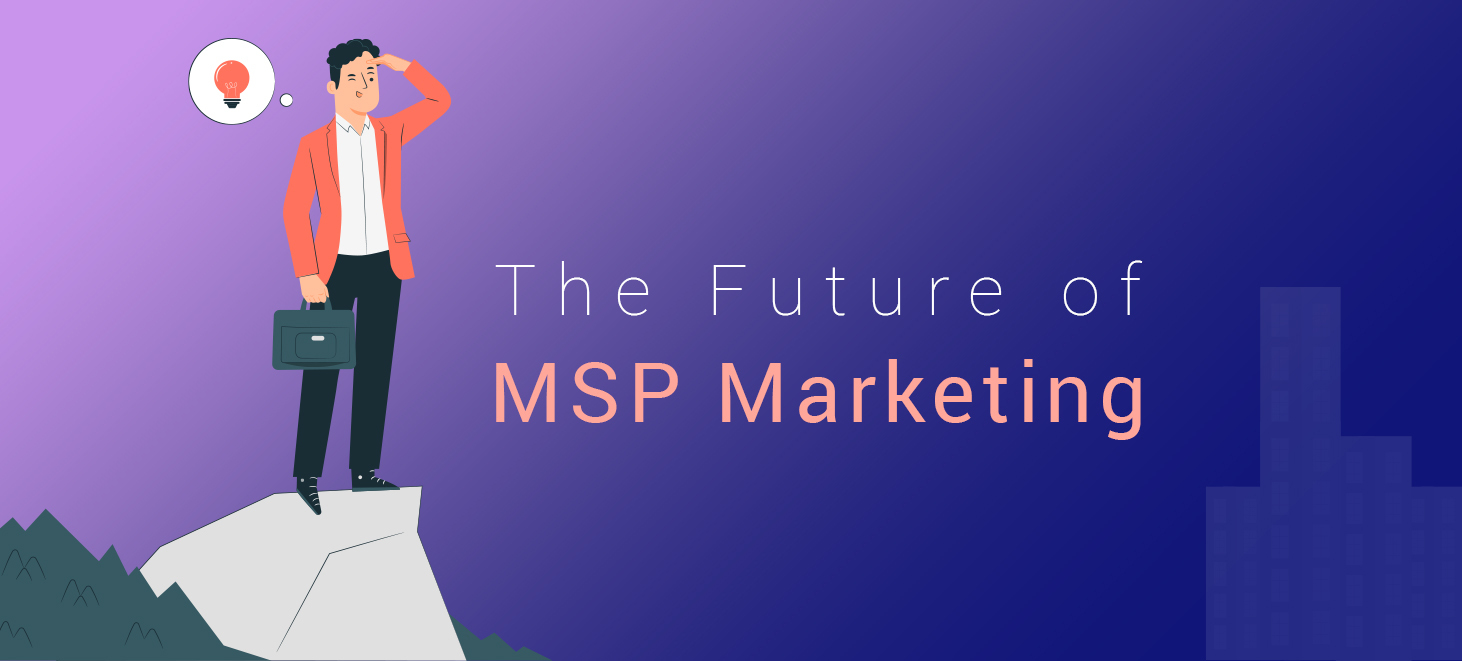
Looking ahead, the landscape of MSP marketing is likely to continually evolve as technology progresses and customer preferences change. MSPs must adapt their marketing strategies to remain competitive.
-
Personalization: In an era of increased digital noise, personalized marketing efforts will become even more critical for MSPs. Tailoring content, offers, and communication to the specific needs and preferences of individual clients will help MSPs cut through the clutter and build deeper connections.
-
AI and Automation: Artificial intelligence (AI) and automation technologies will play a significant role in streamlining marketing processes for MSPs. From data analysis and lead scoring to chatbots and predictive analytics, AI-powered tools will enable MSPs to deliver more targeted and efficient marketing campaigns.
-
Data Privacy and Security: With growing concerns about data privacy and security, MSPs will need to prioritize transparency and compliance in their marketing efforts. Demonstrating a commitment to protecting client data and adhering to industry regulations will be essential for earning trust and credibility.
-
Content Diversity: As consumers’ preferences for consuming content continue to evolve, MSPs will need to diversify their content marketing strategies. Embracing formats such as video, interactive content, and virtual events will help MSPs engage with their audience more effectively and stand out in a crowded market.
-
Value-Based Messaging: Instead of focusing solely on features and capabilities, MSP marketing will increasingly emphasize the value and outcomes that clients can expect from partnering with an MSP. Communicating the tangible benefits, such as increased productivity, reduced downtime, and improved security, will resonate more strongly with potential clients.
-
Partnerships and Ecosystems: Collaboration with other technology providers and industry partners will become increasingly important for MSPs. By leveraging partnerships to offer integrated solutions and access to specialized expertise, MSPs can enhance their value proposition and better meet the diverse needs of their clients.
-
Customer Experience Focus: Providing an exceptional customer experience will be a key differentiator for MSPs in the future. From the first interaction through ongoing support and beyond, MSPs must prioritize delivering a seamless and personalized experience that exceeds client expectations.
-
Sustainability and Social Responsibility: As environmental and social issues gain prominence, MSPs will need to demonstrate their commitment to sustainability and social responsibility in their marketing efforts. Highlighting initiatives such as carbon footprint reduction, diversity and inclusion programs, and community involvement can help MSPs attract clients who share similar values.
The Cold, Hard Truth about MSP Marketing Scope
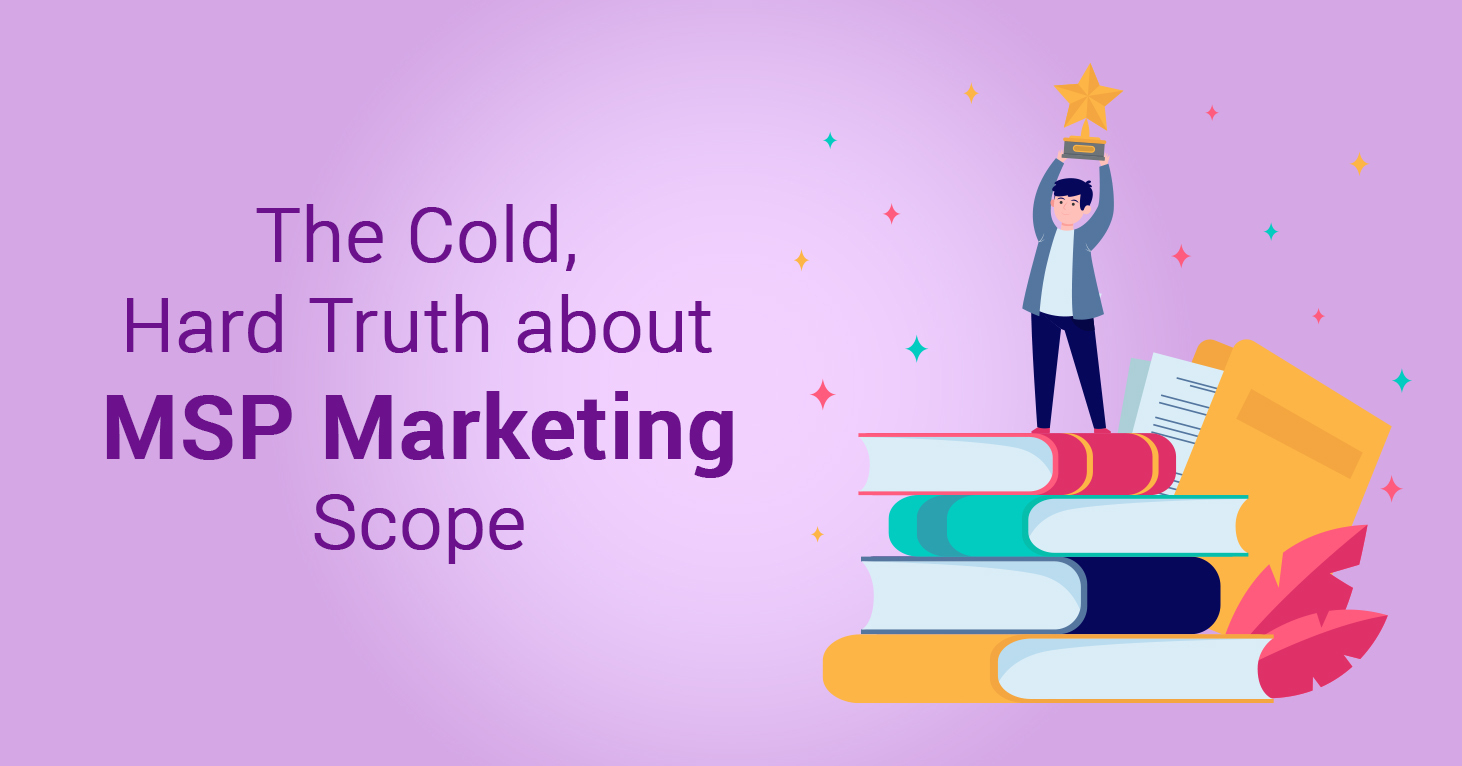
But in the end, the most important thing to understand about all of this is that NONE of these techniques are the “silver bullet” you’ve been looking for. If anyone ever tells you that any one of the approaches that was previously mentioned will generate the results you need, or will guarantee the outcomes you’re after, they’re failing to see the forest for the trees.
Because to truly achieve your goals in both the short and long-term perspectives, you won’t just be picking any one of these methods at random. You’ll be using exactly the right tactics that your unique MSP marketing strategy calls for.
That’s right—don’t just use pay-per-click and search engine optimization because you heard a colleague at IT Nation rave about his own results. Use them because you know your ideal customer is using Google to make purchasing decisions. Is your buyer not on Google? Make sure that you’re attending or speaking at any event in your area that is relevant to your ideal customer’s industry and promote that event on social media via both organic and paid tactics.
Even once you’ve increased traffic to your website, don’t let those cold leads slip through your fingers. Use remarketing tactics to continue to make contact with them until they’re finally ready to make that purchase.
For most managed services providers, it won’t be a single one of these that lets you reach your lead generation goals. It will be a combination of them. But more than anything, it will be all of these techniques working in tandem—feeding into and empowering each other—creating the type of cohesive, thoughtful and rewarding campaign that your target audience won’t be able to look away from.
If you’re able to orchestrate things from that point of view, there’s truly no limit to what your MSP marketing will be able to accomplish.
Here are some resources to help you get started with your MSP marketing plan:
-
Inbound vs. Outbound Marketing: Which is Right for your MSP?
-
MSP Marketing in 2024: What Should MSPs Prioritize This Year
-
MSP Websites – Everything MSPs Need to Know Before Building a Website
FAQs
-
What is the fastest way to acquire new MSP customers when referrals run dry?
The most effective MSP marketing strategy for quick client acquisition varies based on your ideal customer profile and other specifics. However, digital marketing channels like social media and pay-per-click (PPC) advertising are often the quickest methods to connect with a large audience swiftly.
Choose an MSP marketing agency that can deliver a digital marketing campaign tailored to engage your target audience and guide them through the buying journey.
-
What does MSP stand for in marketing?
A Managed Services Provider (MSP) provides IT services to businesses remotely. If you’re an MSP owner, you’re familiar with this. But do your potential clients understand what you do? That’s where MSP marketing agencies step in. They employ strategic marketing to boost your MSP’s visibility, appeal, and profitability. Skilled MSP marketers will position your company in front of your target market, even those who may not know what an MSP does, by highlighting the solutions you offer for their specific problems.
Identifying the issues your potential customers are attempting to solve is a core component of successful MSP marketing. And how do you figure that out? Through online search engine data. By analyzing popular search queries related to your services, you can target your marketing efforts towards individuals who are looking for the services you offer, even if they’re not familiar with the term “MSP.”
-
Should I hire an SEO company or agency for MSP marketing?
While an SEO company can fine-tune your website to enhance its performance in search engine rankings, elevating your MSP business’s online competitiveness requires more than just SEO. It’s advisable to engage an MSP marketing agency that grasps the unique aspects of the MSP sector and knows what it takes to thrive within it.
-
How do I find a marketing agency for my MSP?
Finding the right MSP marketing company for your needs involves a selective process. Start by searching on Google for MSP marketing companies in your area. Prioritize those with a wealth of experience and a track record of positive customer feedback for your shortlist.
Arrange a meeting with each of the companies on your shortlist. Use this consultation to ask insightful questions that help you determine which agency aligns with your objectives, budget, and specific criteria.
-
What does MSP stand for?
MSP stands for Managed Service Provider. In the context of IT and marketing, an MSP is a company that remotely manages a customer’s IT infrastructure and/or end-user systems on a proactive basis, often under a subscription model. MSPs typically offer services such as network, application, infrastructure, and security management, as well as support and technical services.
-
What is MSP in sales?
In sales, MSP refers to a Managed Service Provider, which is a business model where a company offers a range of IT services on a proactive and managed basis. MSPs in sales are organizations that sell managed IT services to clients, typically under a recurring revenue model, such as monthly or annual contracts. These services can include network management, data backup and recovery, cybersecurity, cloud services, and helpdesk support, among others. The focus in MSP sales is on offering clients ongoing support, maintenance, and monitoring of their IT systems to ensure efficiency, security, and reliability, which in turn helps clients focus on their core business activities.
-
What is managed services in marketing?
Managed services in marketing refer to the practice of outsourcing marketing operations to a third-party provider who manages these services on behalf of a business. Similar to MSPs in the IT industry, managed marketing services providers offer comprehensive marketing solutions that can include strategy development, content creation, digital marketing, social media management, SEO, PPC campaigns, email marketing, analytics, and reporting.
By utilizing managed services in marketing, businesses can benefit from the expertise and resources of specialized marketing professionals without the need for in-house teams. This allows companies to focus on their core competencies while the managed services provider works to enhance their market presence, generate leads, and improve overall marketing ROI.
-
What does MSP stand for in marketing?
In marketing, MSP typically stands for “Marketing Service Provider.” An MSP in the marketing context is a company that offers a comprehensive suite of marketing services to businesses. These services can range from strategic planning and branding to digital marketing, content creation, campaign execution, data analytics, and reporting. Marketing Service Providers help businesses develop and implement effective marketing strategies to reach their target audiences, increase brand awareness, and drive sales.
